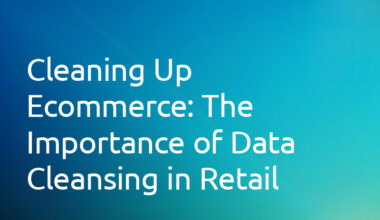Data is paramount within the ecommerce industry. Whether we’re talking about transactional data, customer preferences, or product listings, these digital goldmines play a pivotal role in shaping the strategies and success of online retailers. However, having a vast amount of data isn’t enough. The quality, accuracy, and relevance of this data are what truly matter. This brings us to the critical yet often underestimated process of data cleansing.
Why Data Cleansing Matters in Ecommerce
Data cleansing, in its simplest form, is the process of identifying and correcting errors in data sets. For ecommerce, this involves tasks like removing duplicate product entries, updating outdated customer information, or correcting inaccuracies in product descriptions.
Here’s why this process is crucial:
1. Customer Trust and Loyalty: Imagine a customer’s frustration when they click on a product that’s listed as available, only to find out it’s out of stock. Or think about their confusion when they’re shown personalized product recommendations that have nothing to do with their past purchases. These instances, stemming from erroneous data, erode trust and jeopardize customer loyalty.
2. Operational Efficiency: Accurate data ensures that the supply chain operates smoothly. From inventory management to shipments, clean data ensures there are no hiccups in the process.
3. Accurate Analytics and Reporting: Decisions based on flawed data can lead businesses astray. Clean data ensures that business intelligence tools and analytics provide insights that can be trusted.
Strategic Data Cleansing for Ecommerce
1. Prioritize Critical Data Points: Not all data points are created equal. Prioritize cleansing critical data such as product availability, prices, and customer contact details.
2. Implement Automation Tools: There are numerous data cleansing tools available that can automate much of the process. They can detect inconsistencies, remove duplicates, and even correct certain errors.
3. Routine Data Audits: Make data cleansing a regular activity. Schedule routine audits to ensure that the data remains consistent and accurate.
4. Feedback Loop with Customers: Offer easy ways for customers to report discrepancies they notice. They can be invaluable allies in maintaining clean data.
5. Cross-Functional Team Collaboration: Data accuracy is a cross-departmental responsibility. Ensure that marketing, sales, customer service, and logistics teams are aligned in their data entry and management practices.
The Long-Term Benefits
Strategic data cleansing does more than just “clean up.” It lays the foundation for long-term ecommerce success. With accurate data:
– Marketing campaigns become more effective and yield higher ROI.
– Customer service teams can resolve issues faster, leading to happier customers.
– Inventory management becomes streamlined, reducing overhead costs.
– Crucial business decisions, from product launches to sales strategies, are based on reliable insights.
While data is undeniably the lifeblood of ecommerce operations, its quality determines its real value. Strategic data cleansing is not just a one-time activity; it’s a continuous effort that promises improved operations, better customer experiences, and higher profitability. In the dynamic world of ecommerce, where competition is fierce and customer expectations are perpetually rising, clean data can provide the edge businesses need to stand out and succeed.
Learn more about how data cleansing can benefit your ecommerce business here.
 1.416.619.5349 Ext.325
1.416.619.5349 Ext.325 







